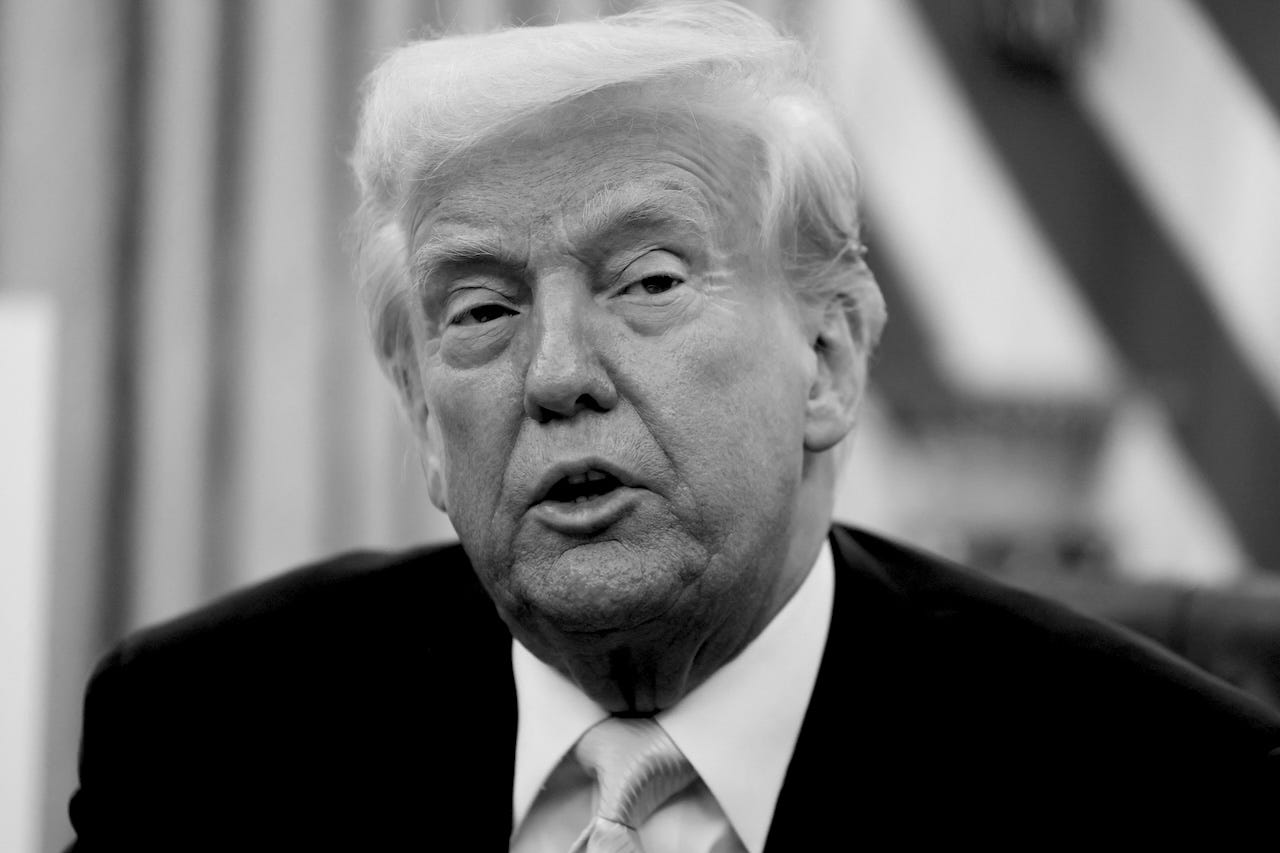The Light and the Heavy
Confronting the Slide Toward Authoritarianism

It’s Friday, when we often post lighter fare to give everyone a bit of a breather in these relentlessly grim times. Look below, and you’ll see the winner of our most recent Talking Five contest, plus a new contest where you can match your pithy (five words or fewer!) answer to the ones our guest chose in the spur of the moment and have a shot at the much-coveted collector’s item—a Talking Feds mug.
But my dispatch today will be short, though not exactly light. I wanted to focus on reporting in The New York Times and elsewhere that documents the spread of the chilling effect of Trump rule into all corners of the private sector.
We already knew that many in government feel compelled to hold their criticism of the new regime because of the ruthless reprisals that Trump officials impose at the slightest perceived pushback.
We know that agency employees have been cowed from even mentioning D.E.I. policies in the hall, lest they be turned in to the authorities by their colleagues, who have been encouraged to keep an ear out for such apostasy. This is stuff right out of the late-1960s Iron Curtain repressive societies.
But Trump’s agenda of retribution and intimidation has begun to make larger inroads on free expression in the private sector. More and more people across various industries are keeping their heads and voices down, fearing the consequences of displeasing the maximum leader and his sycophantic crew.
Here are just some of the more outrageous recent examples that have already come to light.
Trump ordered that the law firm that took on Jack Smith as a client have the security clearances of its lawyers revoked and that all contracts with the federal government be examined. That’s a vicious attack, unrelated to any legitimate government policy, on the very idea of the right to counsel—fundamental to the justice system, not to mention a constitutional guarantee. And he has this morning added another law firm to the bad list, with more apparently to come.
Trump also petulantly pulled the security clearances of public servants who fit his outsized notion of disloyalty—or really, lack of slavish obedience. This list includes Joe Biden, former Secretary of State Antony Blinken, General Mark Milley, and a long roster of prominent intelligence officials who signed a letter suggesting the Hunter Biden laptop story was Russian disinformation. Many of these people are the subjects of serious death threats from Iran and other adversaries.
And interim D.C. U.S. Attorney Ed Martin—who, for now, is leading the fierce contest for most vindictive and vicious of the Trump DOJ appointees—announced earlier this week that his office, the largest in the country, will not consider résumés from students who attend schools with D.E.I. policies. That’s despite the fact that some of the offending policies are congressional dictates under Title VI of the Civil Rights Act.
But the suppression of ideas that are out of favor with the new regime—especially if they involve criticism of the president—has become more substantial and widespread in recent days.
Consider a bone-chilling report in Thursday’s New York Times, “People Are Going Silent: Fearing Retribution, Trump Critics Muzzle Themselves.”
The article details the self-censorship of federal employees—even fired ones who fear that criticism of the administration could still exact a cost. And it describes longtime Republican hawks, repelled by Trump’s lies about and abandonment of Ukraine, who nevertheless have declined to criticize him.
It may not be just a primary challenge funded by Elon Musk that is cowing them. Another part of the motivation, suggests Democratic Representative Eric Swalwell, is personal security: “‘They tell me that their wives tell them,’” Swalwell says, “‘Don’t contribute to us getting harassed at church or at the grocery store or at the club.’”
But the most unsettling silence is from prominent figures in academia, business, and media. The article details the timidity of university presidents, who fear the loss of millions of dollars in federal funding, and CEOs, hoping their silence may lead to favorable treatment from Trump on tariffs or other economic policies.
One university president, Michael Roth of Wesleyan—who has been outspoken in his criticism of the administration—nevertheless notes that “[t]his is the greatest pressure put on intellectual life since the McCarthy era.” He continues, “I think it’ll be seen in the future, as that time was seen, as a time when people either stood up for their values or ran in fear of the federal government.”
A series of well-heeled legacy media organizations have tempered their commitment to truthful coverage to curry favor with Trump. It’s prompted a wave of resignations—including my own from the Los Angeles Times.
This week, the L.A. Times unveiled an AI-driven feature that is supposed to counter reporters’ ideological leanings. It’s part of owner Patrick Soon-Shiong’s campaign to bring more “fair and balanced” coverage of Trump in particular. Unfortunately, on its first day, the newfangled tool provided a benign account of the KKK to counter an article about the 100th anniversary of the city of Anaheim’s removal of KKK members from their city council.
These are toxic developments that bring us within shouting distance of totalitarian societies that brook no dissent or displeasure with the government.
The Times article about Trump critics’ increasing silence quotes the assessment of influential Harvard Professor Steven Levitsky, the author of How Democracies Die and a previous guest on Talking Feds:
"When you see important societal actors—be it university presidents, media outlets, CEOs, mayors, governors—changing their behavior in order to avoid the wrath of the government, that’s a sign that we’ve crossed the line into some form of authoritarianism.”
And isn’t this basically how things go in authoritarian societies? There are a few high-profile sacrificial lambs, like Jack Smith, figures whom the leader singles out as lessons in what happens to people who cross him. Then there’s a whole sector of prominent business and academic leaders who play it safe and temper their conduct so they can continue to prosper as best they can under the regime’s rules. And finally, the bulk of society keeps their heads down so they can work and raise their families without attracting the rulers’ wrath.
Still, we should not overstate Trump’s success in cowing American society as a whole. We still have robust dissent, and in some ways, it's growing by the week as the consequences of Trump’s dictatorial policies become clearer across the country. Moreover, the government is blundering and feckless, and thus far, the federal courts have largely stepped up to counter the most flagrant overreaches. Finally, as Levitsky notes, “No democracy this old or this rich has ever broken down.”
Yet it’s clearly a time for fighting. There are sectors of society—I include the Department of Justice here—that have already sustained grievous decline and others at immediate risk. An economy that, two short months ago, was the envy of the world may be barreling toward recession. Who knows if and how it will even be possible to return the United States to its position of global leadership?
But protest and pushback still register. Trump’s approval ratings have taken a hit in the time he’s been in office. His approval ratings are the lowest recorded for any president at this stage of his term—other than Trump himself in 2017. Republicans in Congress, who have been completely spineless in their servitude, have been advised to avoid town halls and their constituents’ censure altogether. We’ve even heard murmurs of discontent from a few of them over DOGE cuts and the Ukraine debacle. And Elon Musk’s authority and flippancy grate more on the country every day.
Moreover, there are more voices stepping into the breach left by legacy media every week. Just yesterday, Will Sommer, a prominent cultural reporter focusing on fringe right-wing movements, left The Washington Post to join The Bulwark. There is an increasing demand for independent outlets that tell the truth, shine a light on Trump’s outrages, and build community. This Substack is hopefully one of them. We are funded completely by subscribers, which removes the corporate pressures that have compromised the likes of the Post and the L.A. Times. And we’re not going anywhere.
After the election, some combination of exhaustion, apathy, and disgust kept the opponents of Trump—who still outnumber his supporters—from raising their voices and banding together to anything like the degree we saw in 2017. But as the existential stakes for democracy posed by his radical Project 2025-driven agenda emerge, they call on us to pick up our game. I am appalled and unnerved by how far we’ve fallen in six weeks, but I still believe strongly that if we fight, we—that is to say, democracy—will win.
Talk to you later.
Now on to the lighter fare, and your chance at a Talking Feds mug!
Thanks to everyone who threw their hats in the ring for our Caption This contest two weeks ago! As always, a stellar mix—some darkly funny, some chillingly prescient, and more than a few reminding us (to our dismay) that the Jan. 6 choir still exists. And, judging by the literary references, you are one erudite bunch.
For our winner, we looked for something as eerily realistic as it was devastating—and Darcy Gonzales nailed it with:
“Remake of Birth of a Nation.”
Yikes.
Congrats, Darcy! Someone from our team will reach out soon to send you your coveted Talking Feds mug.
And here’s a new round of our Five Words or Fewer contest.
Elon Musk—because of course—has been sending out mass emails to government officials, demanding: “What were the five things you accomplished this week?”
We posed that exact question to Tara Setmayer, Bob Shrum, and Jacob Weisberg last week—check out their responses at the 58:50 mark in our latest roundtable episode, “Anyone Unhappy With Elon?” (Link here.)
Now, it’s your turn: Drop your best five-words-or-fewer answer here for a shot at the highly coveted Talking Feds mug. Let’s see what you’ve got.



As an elder who came of age in the 60’s, many of my friends joined the military in a burst of patriotism and a rush of male testosterone. These 18 and 19 year olds soon confronted the reality of the horrors of Vietnam and the unwelcome reception of the American public. That didn’t mean they could walk away from their duty. And they didn’t. So I say to those in Congress who took an oath to the Constitution that there is no “not what I signed up for” excuse. You wanted to serve your country together with all the status attached to the position. And you have an obligation now regardless of whether your wives don’t want to be “harassed at Church, the grocery store or the Club”. Yes, it’s personal. It is for all of us.
Donald Trump is a Russian asset, according to a story in "The Guardian" (1/29/21), who was recruited by the KGB as far back as 1987. The hollowing out of our government and of our military, and the other horrors that Trump is currently inflicting on Ukraine and the rest of the free world, are Moscow's reward for its longterm (financial) investment. in him.